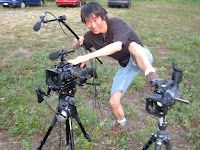 By Dan Parkes (Director/editor)
By Dan Parkes (Director/editor)As cast and crew we are all very proud of the film we produced. Not only the way it was made and for how little, but the final product is something we are very satisfied with, as in many cases it has exceeded expectations. However, that doesn't mean it couldn't have been a lot better!
In fact, from my perspective as the director I think there were 10 key mistakes that I was personally involved in making:
1. Under-developed script
The script was an adaption of a short film concept that itself was based on a true story. It was written in a matter of months and although we had many different drafts and long script editing sessions with three writers, the producers and a script supervisor present the fact remains that a lot more could and should have been done. It should have been a lot shorter, several scenes could have been reduced or collated together and in particular dialogue condensed to avoid unnecessary repetition. (see tip #13).
 2. Name of the film
2. Name of the filmA film title should be memorable and this one just isn't. People struggle with it. It was originally entitled "Apple Pie" but this seemed too simple and it went through several different versions until resting on a fictitious village name and the name of the dessert. It was a nice idea...but if people can't remember it, then it doesn't work (see tip #5).

3. Too many locations and characters
We tried to keep the number of locations and characters to a minimum, with several characters condensed into one, but somehow these aspects of the production kept expanding and in the end made a lot more work for everyone involved (see tip #15).
4. Target audience
We never really addressed who our target audience was, other than those who enjoy the generic "drama" genre. This was probably due to the "inspired by a true story" and "passion piece" elements of the production, but that is no excuse. We should have identified our audience more, as this is crucial for marketing the film later, and also for considering classification (see tip #95).
 5. Logo clearance
5. Logo clearanceDuring the production we did try to avoid including logos and brands that could cause issues, but we just weren't vigilant or inventive enough, especially in two particular cases involving beer and TinTin pajamas that lead to headaches in post-production (see tip #88).
 6. No sales agent
6. No sales agentThis was a biggie. It was not until the film was well done and dusted that there was even a mention of "a sales agent" and we still didn't even know who or what it meant! In actual fact we shouldn't have even finished the first draft before organising one. By all means don't make the same mistake of neglecting to learn about this before entering production (see tip #92)
7. Gave away our budget
When we completed the film on so little -despite assurances that we couldn't do it- we thought this was a positive aspect of the production that we could use to help the profile of the film. So early press releases and film trailers mention the next-to-nothing budget. It might work for a zombie film made on £45, but for a serious village-based drama we actually shot ourselves in the foot. Since the film does not look low-budget we were selling ourselves short and giving the wrong impression. And that's exactly what happened. (see tip #14).
 8. Too festival focused
8. Too festival focused Still unaware of what a sales agent was we instead focused on film festivals, mistakenly believing this would lead to more opportunities. We played the "premiere" game aiming for festivals that could premiere the film. While it wasn't a total failure, actually our time and money would have been better spent getting a sales agent and proper distribution. (see tip #92).
 9. Indie distributor
9. Indie distributorWe eventually settled for an indie distributor which seemed like a good decision at the time, but in reality at our present rate we are probably unlikely to make even our budget back any time soon. Personally, I think it would have been better if we had gone the self-distribution route, even though such an option has definite drawbacks (see tip #93).
 10. The blog and social media
10. The blog and social mediaOur low budget film production blog has from the very start worn its heart on its sleeve, detailing the mistakes, agony and pitfalls of making a next-to-nothing budget film, as well as sharing what worked for us with the hope that other filmmakers might join in with more advice. Instead many fellow filmmakers have at best misinterpreted our intentions, at worst used it as a platform to launch insults and abuse (see tip #98).
So was this blog a waste of time, a mistake? Well from the positive feedback I am sure there are filmmakers who will benefit from it, as there is everything we would like to have known if only someone else had told us before we started. But the fact is that while modern web-based social media has brought everyone closer together, that also means you are brought close to some real nutters! So in all honesty, I would recommend creating and maintaining a distance when it comes to social media, as the emotional cost of dealing with on-line immaturity is sometimes just not worth it.


















